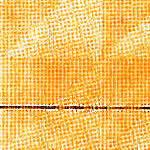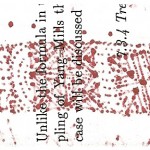 Ciało jest fragmentem. Własne jest jedynym fragmentem, którego na pewno nie można zawłaszczyć, bo nie można się go zrzec. Oddalenie pretensji do ciała jest śmiertelne. Nie jest najważniejsze co to znaczy, że ciało jest. Naprawdę liczy się tylko to, że jest. Nawet, jeśli jest złudzeniem, to rzeczywistym. Ból prawdziwy czy złudny, wszystko jedno, doświadczany zawsze jest niewątpliwy. Ciało, obręb (lepiej: centrum) samopoczucia, w którym rodzi się unikalny wymiar interakcji części składowych i wyodrębnionego fragmentu z resztą. Somatyczne jest wykrywaczem specjalnego pasma świata. Ciało jest strukturą, której niesamodzielność uprawdopodobnia nie tylko samą siebie, ale i to, co ją dopełnia. Niesamodzielność zakłada fragmentaryczność, a więc i całość, do której fragment należy. Zastanawiające jest, że ból jest instancją, którą czuje się jako weryfikację ciała, jednocześnie jest tym uczuciem, które nie potrzebuje odniesień do czegoś poza nim samym. Jakkolwiek może być kojarzony z określonym bodźcem, gdy zaistnienie, staje się samowystarczalnym centrum. Czytaj dalej
Ciało jest fragmentem. Własne jest jedynym fragmentem, którego na pewno nie można zawłaszczyć, bo nie można się go zrzec. Oddalenie pretensji do ciała jest śmiertelne. Nie jest najważniejsze co to znaczy, że ciało jest. Naprawdę liczy się tylko to, że jest. Nawet, jeśli jest złudzeniem, to rzeczywistym. Ból prawdziwy czy złudny, wszystko jedno, doświadczany zawsze jest niewątpliwy. Ciało, obręb (lepiej: centrum) samopoczucia, w którym rodzi się unikalny wymiar interakcji części składowych i wyodrębnionego fragmentu z resztą. Somatyczne jest wykrywaczem specjalnego pasma świata. Ciało jest strukturą, której niesamodzielność uprawdopodobnia nie tylko samą siebie, ale i to, co ją dopełnia. Niesamodzielność zakłada fragmentaryczność, a więc i całość, do której fragment należy. Zastanawiające jest, że ból jest instancją, którą czuje się jako weryfikację ciała, jednocześnie jest tym uczuciem, które nie potrzebuje odniesień do czegoś poza nim samym. Jakkolwiek może być kojarzony z określonym bodźcem, gdy zaistnienie, staje się samowystarczalnym centrum. Czytaj dalej
Archiwa tagu: body
Man makes the things out of himself (Vico)
Cytat
 It is noteworthy that in all languages the greater part of the expressions relating to inanimate things are formed by metaphor from the human body and its parts and from the human senses and passions. Thus, head for top or beginning; the brow and shoulders of a hill; the eyes of needles and of potatoes; mouth for any opening; the lip of a cup or pitcher; the teeth of a rake, a saw, a comb; the beard of wheat; the tongue of a shoe; the gorge of a river; a neck of land; an arm of the sea; the hands of a clock; heart for center (the Latins used umbilicus, navel, in this sense); the belly of a sail; foot for end or bottom; the flesh of fruits; a vein of rock or mineral; the blood of grapes for wine; the bowels of the earth. Heaven or the sea smiles; the wind whistles; the waves murmur; a body groans under a great weight. The farmers of Latium used to say the fields were thirsty, bore fruit, were swollen with grain; and our rustics speak of plants making love, vines going mad, resinous trees weeping. Innumerable other examples could be collected from all languages. All of which is a consequence of our axiom (120) that man in his ignorance makes himself the rule of the universe, for in the examples cited he has made of himself an entire world. So that, as rational metaphysics teaches that man becomes all things by understanding them (homo intelligendo fit omnia), this imaginative metaphysics shows that man becomes all things by not understanding them (homo non intelligendo fit omnia); and perhaps the latter proposition is truer than the former, for when man understands he extends his mind and takes in the things, but when he does not understand he makes the things out of himself and becomes them by transforming himself into them.
It is noteworthy that in all languages the greater part of the expressions relating to inanimate things are formed by metaphor from the human body and its parts and from the human senses and passions. Thus, head for top or beginning; the brow and shoulders of a hill; the eyes of needles and of potatoes; mouth for any opening; the lip of a cup or pitcher; the teeth of a rake, a saw, a comb; the beard of wheat; the tongue of a shoe; the gorge of a river; a neck of land; an arm of the sea; the hands of a clock; heart for center (the Latins used umbilicus, navel, in this sense); the belly of a sail; foot for end or bottom; the flesh of fruits; a vein of rock or mineral; the blood of grapes for wine; the bowels of the earth. Heaven or the sea smiles; the wind whistles; the waves murmur; a body groans under a great weight. The farmers of Latium used to say the fields were thirsty, bore fruit, were swollen with grain; and our rustics speak of plants making love, vines going mad, resinous trees weeping. Innumerable other examples could be collected from all languages. All of which is a consequence of our axiom (120) that man in his ignorance makes himself the rule of the universe, for in the examples cited he has made of himself an entire world. So that, as rational metaphysics teaches that man becomes all things by understanding them (homo intelligendo fit omnia), this imaginative metaphysics shows that man becomes all things by not understanding them (homo non intelligendo fit omnia); and perhaps the latter proposition is truer than the former, for when man understands he extends his mind and takes in the things, but when he does not understand he makes the things out of himself and becomes them by transforming himself into them.
Giambattista Vico ([1774] 1970) The New Science of Giambattista Vico. Tran. from the third edition by Thomas Goddard Bergin and Max Harold Fisch. Ithaca, NY: Cornell University Press. (wydanie polskie: Giambattista Vico: Nauka nowa. Tłum. Jan Jakubowicz. Oprac. Sław Krzemień-Ojak. Warszawa 1966)
Cytat za: John O’Neill, Five Bodies. Re-figuring Relationships, SAGE Publications 2004
